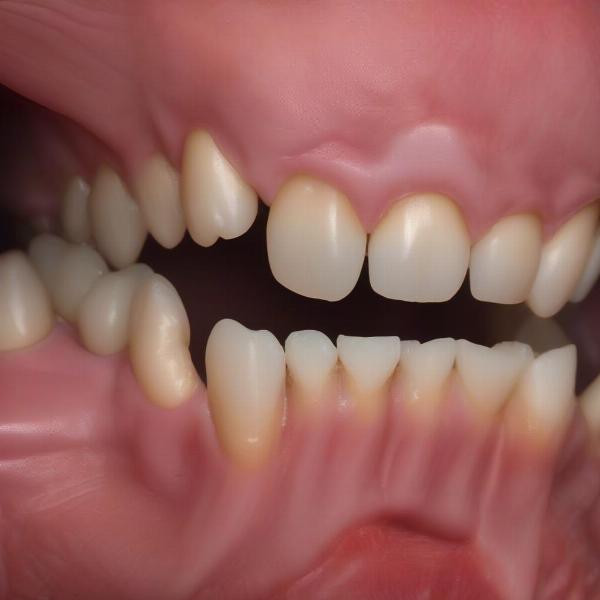Tartar buildup on a dog’s teeth is a common concern for many owners. While several products address this issue, “frugaria for tartar dogs” is a query that needs further clarification. This article will explore tartar control in dogs, examining various methods, including potential benefits of fruits (like strawberries, a common association with “frugaria”) and addressing the limitations and potential risks associated with home remedies. We’ll delve into effective strategies and provide expert insights to help you maintain your canine companion’s oral hygiene.
 Dog with tartar buildup on its teeth
Dog with tartar buildup on its teeth
Understanding Tartar in Dogs
Tartar, also known as dental calculus, is a hardened plaque that forms on the teeth. Plaque, a sticky film containing bacteria, food particles, and saliva, can mineralize over time, leading to tartar formation. If left untreated, tartar can cause gum inflammation (gingivitis), periodontal disease, and even tooth loss. It can also contribute to bad breath and other health problems.
Is Frugaria (Fruit) Beneficial for Tartar Control in Dogs?
The term “frugaria” likely refers to fruits, and some fruits, like strawberries, are touted for their potential teeth-whitening properties in humans. However, applying this logic to dogs requires caution. While small amounts of certain fruits can be part of a healthy dog diet, they are not a substitute for proper dental care.
Can Strawberries Remove Tartar in Dogs?
Strawberries contain an enzyme called malic acid, which is believed to have some whitening effects. However, the concentration of malic acid in strawberries is insufficient to significantly impact established tartar in dogs. Additionally, the sugar content in strawberries can contribute to plaque formation if not brushed away.
Effective Tartar Control Methods for Dogs
Maintaining good oral hygiene for your dog involves a multi-pronged approach:
- Regular Brushing: The most effective way to prevent tartar buildup is by brushing your dog’s teeth daily with a veterinarian-approved toothpaste.
- Dental Chews and Treats: These can help mechanically scrape away plaque and tartar. Look for products approved by the Veterinary Oral Health Council (VOHC).
- Dental Diets: Specifically formulated kibble can help reduce plaque and tartar formation.
- Professional Dental Cleaning: Regular veterinary dental cleanings under anesthesia are essential for removing existing tartar and addressing any underlying dental issues.
When to Consult a Veterinarian
If you notice significant tartar buildup, red or swollen gums, bad breath, or changes in your dog’s eating habits, consult your veterinarian immediately. They can perform a thorough oral examination and recommend the appropriate course of treatment.
Conclusion
While the search term “frugaria for tartar dogs” highlights a desire for natural remedies, it’s crucial to understand that fruits are not a substitute for established dental care practices. Regular brushing, appropriate dental chews, and professional cleanings are the cornerstones of maintaining your dog’s oral health. Always consult your veterinarian for personalized advice and guidance.
FAQ
- How often should I brush my dog’s teeth? Ideally, daily brushing is recommended.
- What kind of toothpaste should I use for my dog? Use only veterinarian-approved toothpaste formulated for dogs. Human toothpaste can be harmful to dogs.
- Are dental chews effective? VOHC-approved dental chews can help reduce plaque and tartar.
- How often does my dog need a professional dental cleaning? Your veterinarian can determine the frequency based on your dog’s individual needs.
- Can I use baking soda to clean my dog’s teeth? No, baking soda is not recommended for dog dental care. Consult your veterinarian for safe and effective options.
- What are the signs of dental disease in dogs? Bad breath, red or swollen gums, difficulty eating, and excessive drooling can be signs of dental problems.
- What are the long-term consequences of untreated tartar in dogs? Untreated tartar can lead to periodontal disease, tooth loss, and even systemic health issues.
About ILM Dog
ILM Dog (https://ilmdog.com) is your trusted source for expert advice on all aspects of dog care and well-being, covering breed selection, health, training, nutrition, grooming, and much more. We are dedicated to providing dog owners worldwide with practical, reliable information to ensure their furry companions live long, healthy, and happy lives. From puppy care to senior dog support, we offer comprehensive guidance to help you navigate every stage of your dog’s life. For personalized advice or further information, contact us at [email protected] or call us at +44 20-3965-8624.